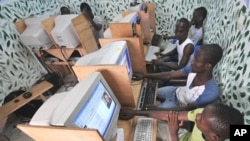African media moguls are meeting in Cameroon to discuss how the continent's newspapers can survive flourishing Internet access.
In an earlier decade the threat bearing down on the media moguls huddling at an annual conference in Cameroon this week might have been army dictators, wary of free press, or import restrictions on newspaper ink.
Printing papers
Keeping a daily paper in print has never been easy in this climate long known for power outages and power struggles.
But at their 2010 conference, this increasingly democratic continent's media tycoons are weighing a different concern: How Africa's newspapers can survive the onslaught of the Internet.
Conference organizer Eric Chinje says the survival question rests at the center of this year's proceedings.
He asks, is the printed press bound to just completely disappear? Emphatically, no, he says, that's our hope. How can we exist alongside all these new types of technology through which the people are receiving information?
Changing technology
The technology that has bankrupted some of the top newspapers in the world. But, it is still a distant threat to newspapers on sub-Saharan Africa.
Internet access in most African countries, reaches just 5 - 15 percent of the population. The one exception being Nigeria, where three out of ten people are online.
Yet experts say that will all change in coming years as Africa's telecom's unroll new phone-based Internet plans.
For example, SEACOM's Brian Herlihy, CEO for the telecom that installed high speed cables off the coast of Kenya, estimates that Internet access will shoot up by 50 percent each year for the foreseeable future.
That, he said, will be driven by Africa's flourishing middle class of professionals earning between $2,000 and $5,000 a year - and by cell phone companies who, in the midst of voice call price wars, see Internet packages as a more profitable sell.
End of an era
And while a blossoming salaried class and cheap Internet rates might be a cause for celebration throughout most of Africa, for the old school press moguls conferencing in Cameroon, Chinje says, it indicates the end of an era.
Really, we have got to reflect on how we can finance ourselves, he says, because the same question is being debated in the United States. The great newspapers like The Washington Post, The New York Times, Chicago Tribune, and so forth, all these newspapers are being confronted by the same problems, he says. The technology has imposed new changes on our industry.
Africa's Newspaper Barons Worried as Internet Rates Spread
- By Drew Hinshaw








